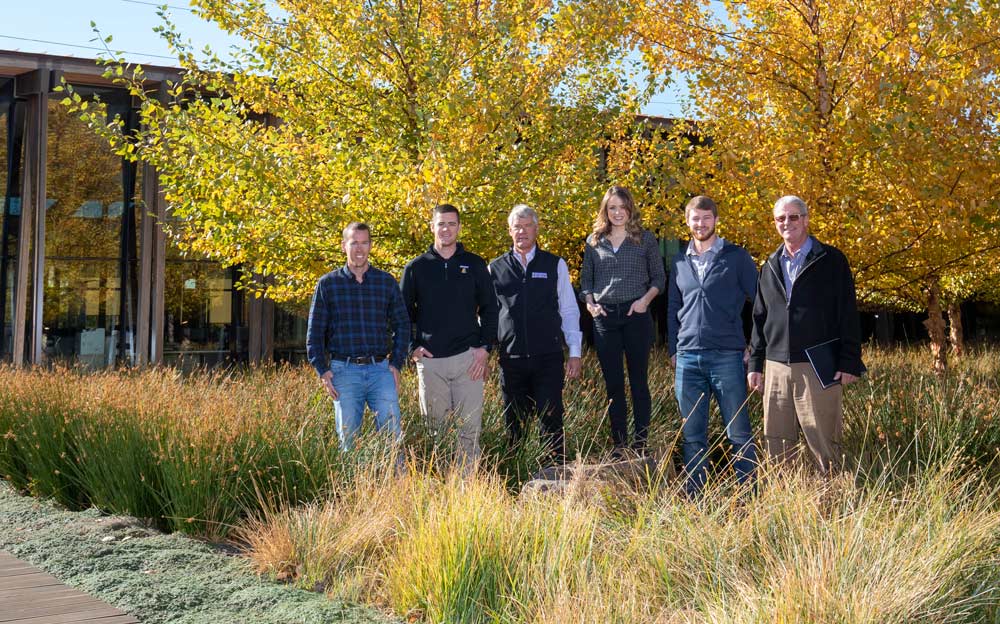
The Plath family members of Washington Fruit and Produce Co., from left, Dan, Nick, Rick, Marianne, Gilbert and Cliff at the company headquarters in Yakima, Washington. (TJ Mullinax/Good Fruit Grower)
Early in their careers with the fruit company their grandfather founded, brothers Rick and Cliff Plath found themselves in the unlikely position of scouting sites for future orchards during an Eastern Washington dust storm.
“I remember in the mid-’80s, driving around in Mattawa with Cliff, and we had to slow down because the sand was blowing so hard,” Rick recalled. “I said to Cliff, ‘Did you ever think we’d be doing this?’”
Expanding in the Columbia Basin changed the direction of the Yakima, Washington-based family business, from a packer with some of its own orchards to a vertically integrated company with tight control over quality, said Rick, now president of Washington Fruit and Produce Co. “When I started 43 years ago, we were about 20 percent captive tonnage. Now, 85 percent of the fruit we pack is our own,” he said.
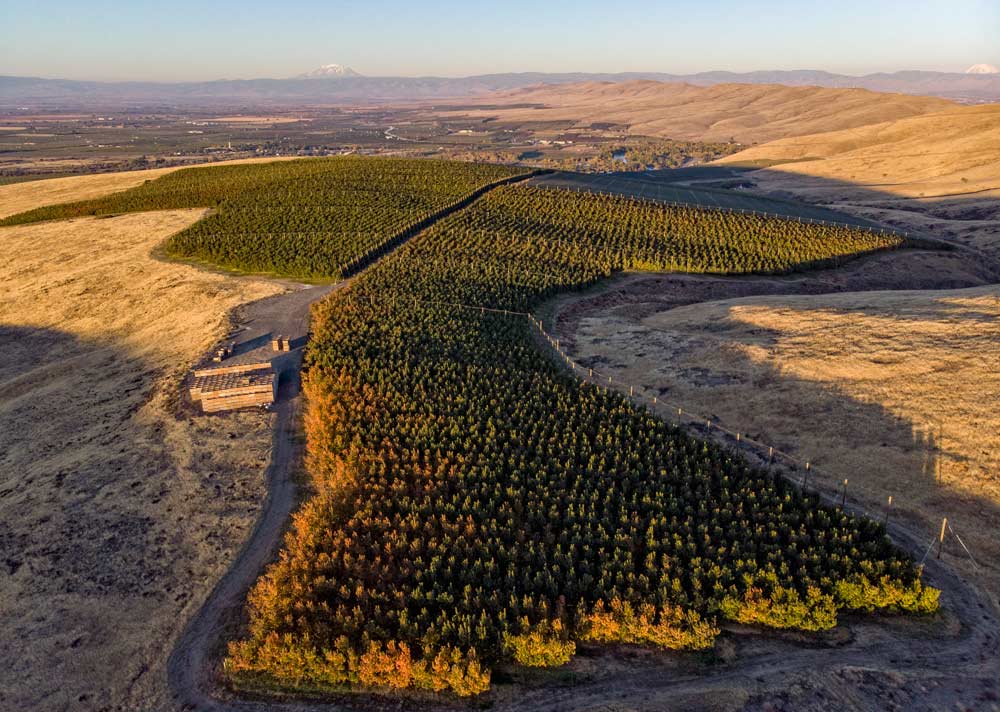
Fall color creeps into a cherry block at the Plath Ranch high atop the Yakima Valley’s Rattlesnake Ridge. The scenic property has been farmed by the family for generations. (TJ Mullinax/Good Fruit Grower)
Known for its carefully considered approach to every aspect of fruit production, whether it’s efficient orchards or the latest packing technology, Washington Fruit has been an industry leader for generations. Now, the family business is prepared for the future with the fourth generation on board and assuming leadership roles.
Plath family,
Washington Fruit and Produce Co.
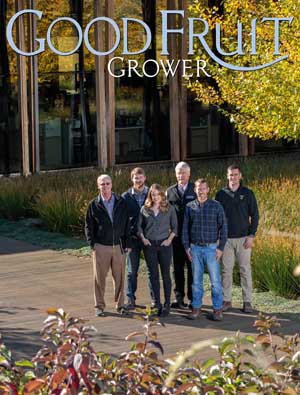
Today, six members of the Plath family work at Washington Fruit, with experience ranging from Rick’s 43 years to just over a year for his daughter, Marianne, and nephew, Gilbert. Cliff has long managed the orchards, but is passing the torch on to his nephews, Dan and Nick. Operations manager Tommy Hanses is the only nonfamily partner in the business.
“Their culture is one of hard-nosed efficiency, but at the same time, they’ve been very generous in sharing with the industry and the larger community,” said Jim McFerson, director of Washington State University’s Tree Fruit Research and Extension Center.
That’s why the Plath family has been recognized as the Good Fruit Growers of 2018. The Good Fruit Grower of the Year award is bestowed annually by Good Fruit Grower magazine to an innovative and inspiring grower or family in North America and is presented during the Washington State Tree Fruit Association’s annual meeting in December. The magazine’s advisory board makes the selection, this year recognizing the Plaths for their leadership in the industry, commitment to high-quality fruit production, investment in their employees and generosity.
“People sometimes think that success means you don’t work as hard, but that’s not the case. They work very hard at what they do,” said Don Gibson, president of Underwood Fruit and Warehouse Co. Washington Fruit markets for Underwood, and Gibson keeps an office in Washington Fruit’s Yakima headquarters, allowing him to work closely with the Plaths.
While the relationship is rooted in a history of common ownership, Gibson said he continues to work with Washington Fruit because they are the best in the business.
Tradition
The Plaths don’t tend to spend much time talking about themselves, but there’s a common storyline they like to tell about the company culture:
“We never want to be the earliest adopters,” Dan said. “Have you heard of the bleeding edge and the leading edge? We want to be leading, but not bleeding.”
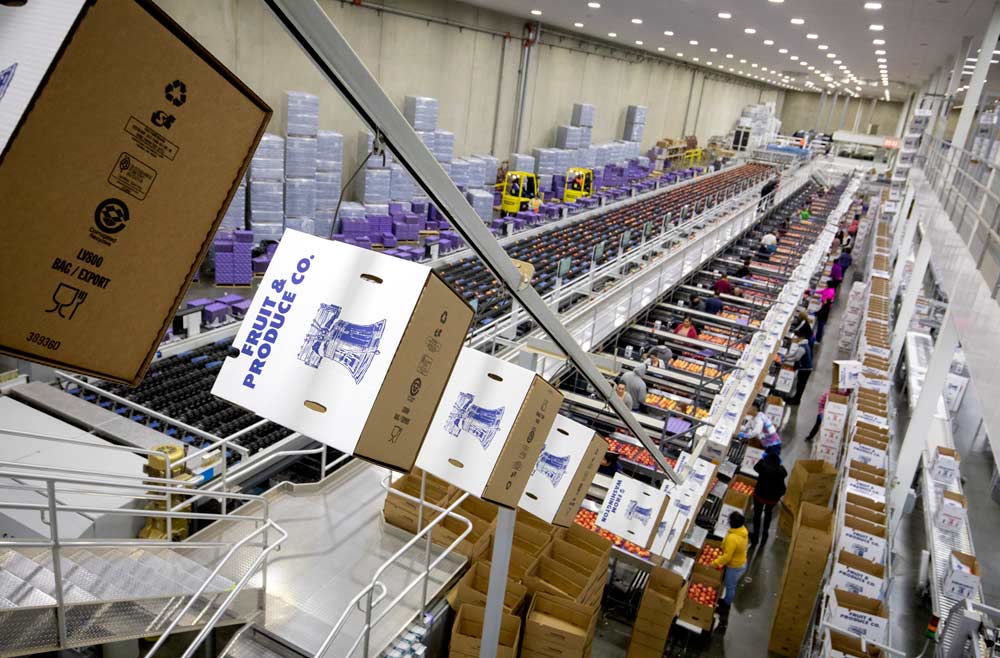
Built in 2015, Washington Fruit’s Yakima packing line features robotic bagging, detailed cull sorting and a conveyor system to move packed pallets without forklifts. (TJ Mullinax/Good Fruit Grower)
It’s an approach learned from his grandfather, Fred M. Plath, who took the reins of the family business in the 1950s and stayed closely involved until his death in 2012 at the age of 89.
“Fred used to say the pioneers get hit by the arrows; we want to be the settlers,” said grower and longtime family friend, Charlie de la Chapelle.
However, it would be a mistake to call the Plaths conservative.
“This is a family that’s unafraid of change,” McFerson said. They were early adopters of integrated pest management strategies and consider quality across the entire production system, from orchard to storage to shipping, he said, always ready to make changes on a large scale if they are proven to increase quality or efficiency. “They are hard-nosed business people,” he said. “If it doesn’t make them money, they aren’t going to do it.”
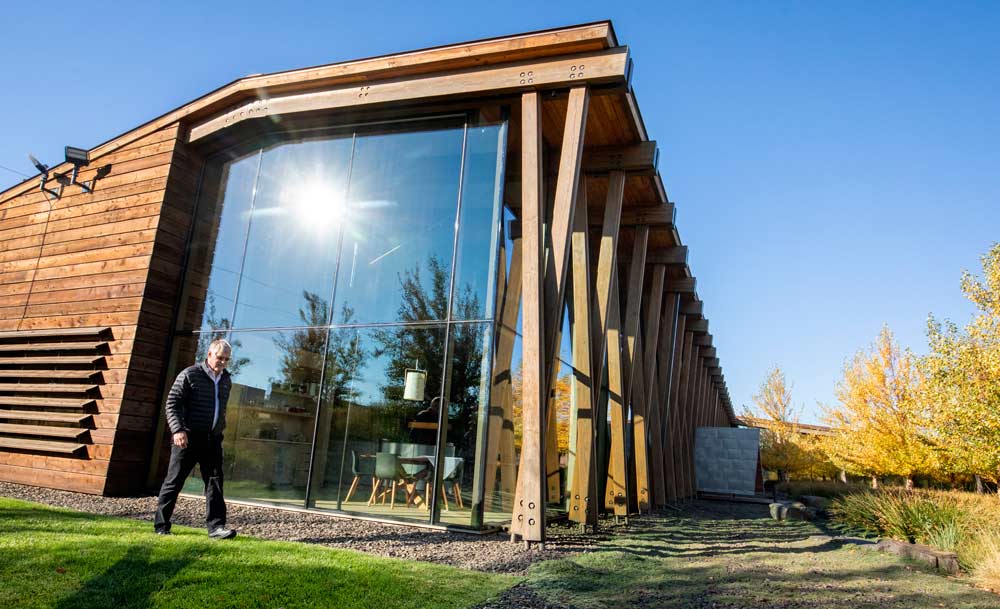
Rick Plath strolls to the Washington Fruit and Produce Co. headquarters in Yakima after visiting the company’s apple packing facilities just across the street. (TJ Mullinax/Good Fruit Grower)
A skeptical approach to new industry fads has served the family pretty well, Cliff and Dan said on a tour of company orchards. They’ve kept high-quality Red and Golden blocks in production for the export market and shied away from club varieties.
“For a long time, we had a rule in the company that we didn’t consider a new variety for planting until the state shipped 100,000 boxes in a week,” Dan said. “It probably saved us from investing in some varieties that didn’t stick around too long, but for Honeycrisp, it cost us being too late.”
They’ve made up lost time, investing in Honeycrisp, and they waived that rule when it came to Cosmic Crisp.
“In the last few years we’ve planted a lot of Honeycrisp, like everyone else, probably too many. Now, we’re planting a significant amount of Cosmic Crisp, like everyone else, maybe too many,” Cliff said with a smile.
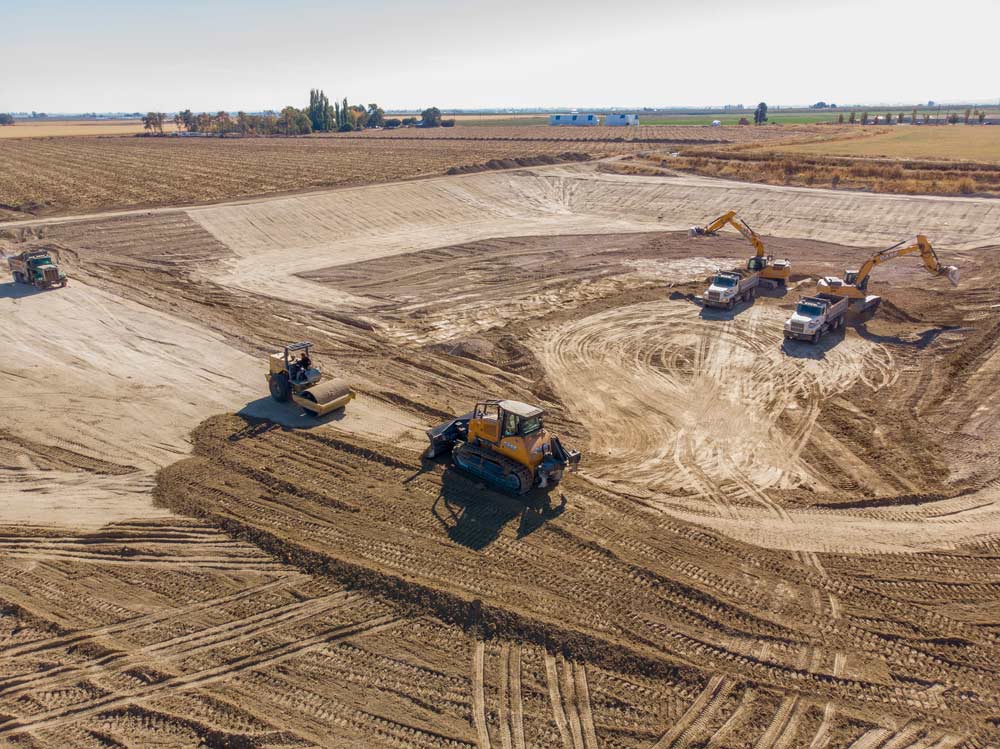
Construction of a 9 million gallon pond underway at a new Columbia Basin orchard Washington Fruit plans to plant with Cosmic Crisp and Ambrosia in 2019. (TJ Mullinax/Good Fruit Grower)
Although the company still harvests Golden Delicious in a 60-acre block planted in 1955, the year Cliff was born, the rest of the company’s orchards have been regularly renovated or replanted.
“My dad had a rule on the Plath Ranch that we needed to take out 5 percent of the orchards every year to keep the farm modern,” Cliff said. “We haven’t always stuck to that, but the philosophy of staying modern has been important to our company.”
Today, their new plantings are all trained to a V-trellis with 2-foot tree spacing and a 10-foot middle, supported by a distinctive system of asymmetrical steel arches. The V-trellis won out over the tall spindle system due to better light capture and increased yields, Dan said.
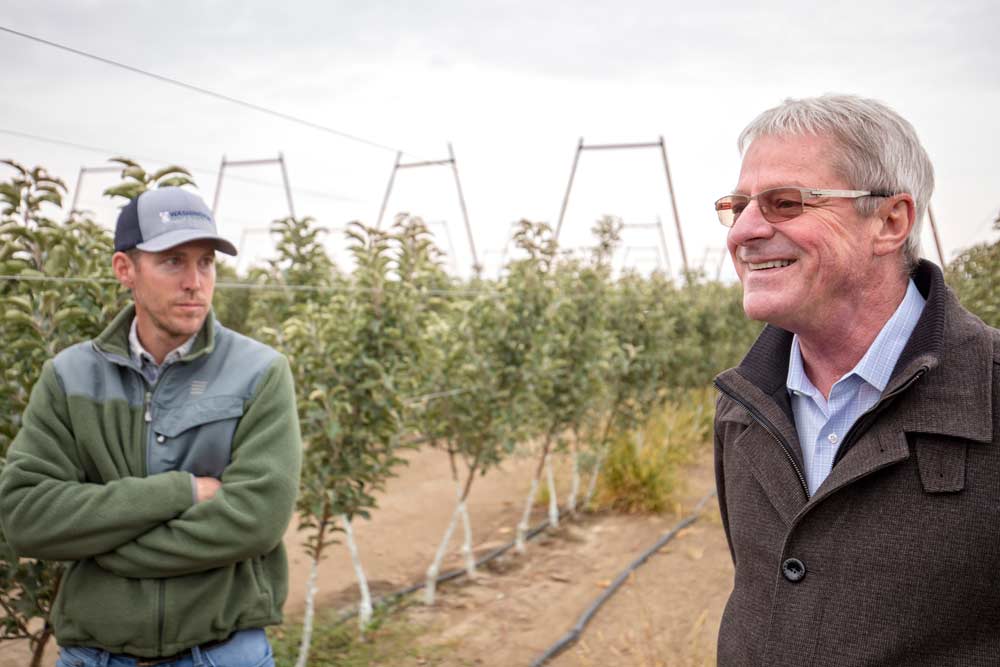
Dan and Cliff Plath discuss their preferred trellis system in a Pink Lady block outside Royal City, Washington. Most of Washington Fruit’s apple production is now in the Columbia Basin. (TJ Mullinax/Good Fruit Grower)
He knows his grandfather would be shocked by the company’s new high-density plantings, based on his reaction to a 2,400-tree-an-acre Gala block they planted as an experiment in 2007. “My father came out and looked at it and said, ‘You boys must be making too much money!’” Cliff said, laughing.
“In 2007, this was intense,” Dan added. “We didn’t do anything like it again for a while. Now, this is close to what everybody does.”
Fresh family
Joining the family business was the plan from an early age for the third- and fourth-generation Plaths who are now part of the business. They all spent summers working various jobs in the orchards, and returning after college was not a question of if, but when.
Marianne Plath joined Washington Fruit just last year, after working for a produce buyer and as an analyst for a freight company. “I feel like all the other jobs I’ve had have helped to prepare me for this,” she said. After a stint with the sales desk, she’s now in the main office, working to understand all aspects of the business. “I’m just trying to learn as much as I can,” she said.

Marianne Plath at Washington Fruit and Produce Co.’s headquarters in Yakima, Washington. (TJ Mullinax/Good Fruit Grower)
Her brother, Nick, started with the company on the orchard side in 2013, after a post-college internship with Stemilt Growers.
“I’ve always pretty well known I wanted to join the family business,” he said, “and during college, I realized I wanted to farm.”
After learning from the ground up, Nick’s responsibilities have expanded to include managing several ranches, planning out H-2A housing and working with field representatives for outside growers that send their fruit to Washington Fruit for packing. As a young grower, he seeks to balance the family tradition of caution with the need to stay ahead in a rapidly changing industry.
“The company was built on conservative, thought-out principles that take a long time to achieve, and today’s world is requiring more modern thinking to keep up,” Nick said, citing the company’s recent move to transition almost 15 percent of their production to organic.
“I mean, I’m a young guy, I see (preference for organics) in a lot of my friends. I understand that’s what the market is demanding.”
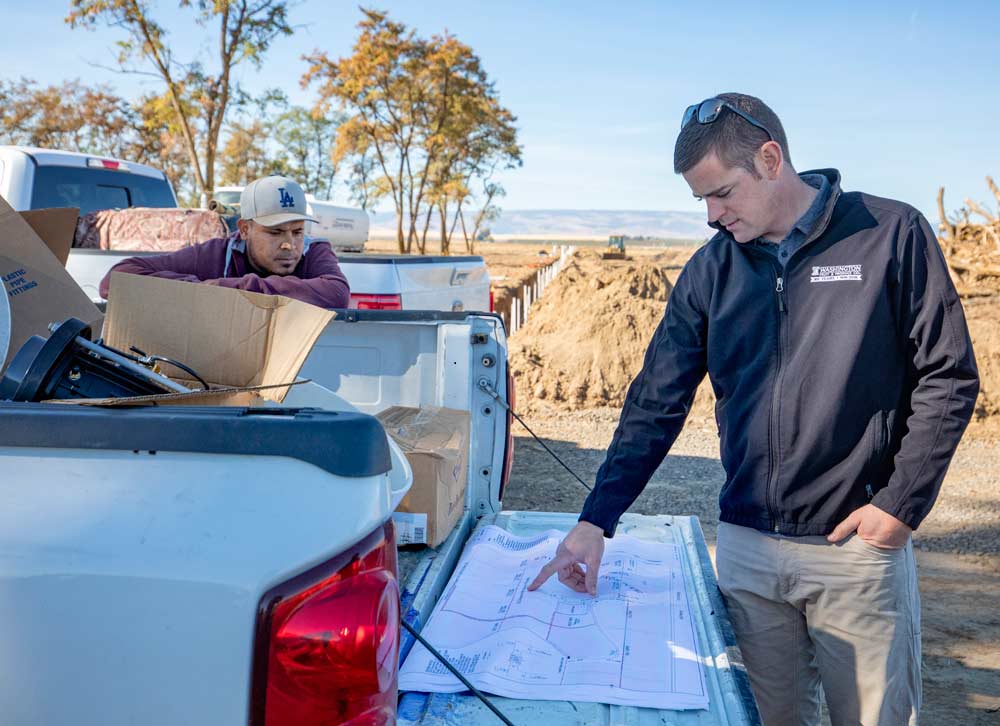
Developing new orchards in the Columbia Basin keeps the company modern and competitive, said Nick Plath. Nick, right, talks with orchard foreman Aaron Lopez, left, about the irrigation system under construction at a new 240-acre ranch near George, Washington. (TJ Mullinax/Good Fruit Grower)
Gilbert is the most recent family member to join the team. At the urging of his dad, Cliff, last year, Gilbert left a job as a produce buyer for Whole Foods Market Inc. Now, he’s working in receiving at Washington Fruit, making sure apples are packed properly into the right controlled atmosphere rooms. But he also set his sights on encouraging the company to modernize data systems.
“We’ve got systems from the ’90s,” he said, as he carried a legal pad with handwritten notes about which CA rooms were loading that day and what he needed to check. He’d rather have a tablet to keep all the data at hand. “As a younger person who is more familiar with technology, I want to help us upgrade,” he said.
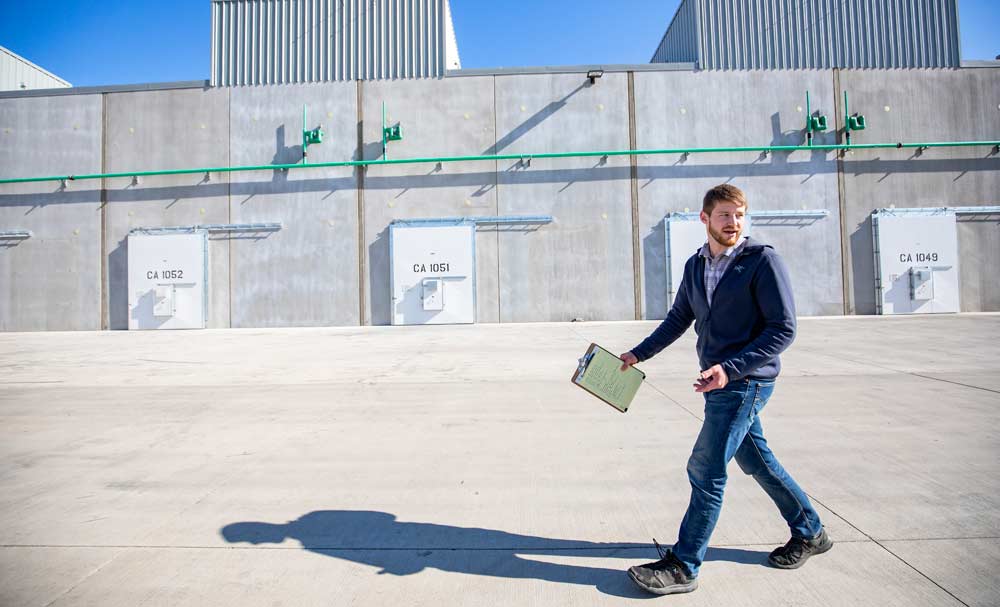
During harvest, Gilbert Plath makes daily rounds of the rooms being loaded to ensure the right fruit ends up in the right place at Washington Fruit’s Yakima headquarters. It’s gotten a little more complicated this year, as the company learns to store organic apples using dynamic controlled atmosphere in these smaller rooms built for organics. (TJ Mullinax/Good Fruit Grower)
Gilbert also proposed a plan to install solar panels on the warehouse roof, to power the storage rooms, and, like Nick, is excited about the company’s expansion into organics.
That’s the best part of having the next generation join the business, Rick said. “It’s nice having the younger people around so we are not doing things like we’ve always done them,” he said.
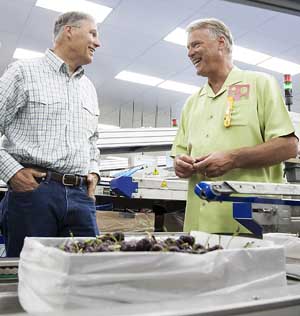
Investing in new state-of-the-art packing technology has been a priority for Washington Fruit. In 2014, Rick Plath gave Washington Gov. Jay Inslee a tour of their new cherry line on its third day of operation. (TJ Mullinax/Good Fruit Grower)
And there are lots of new things on Washington Fruit’s agenda. Their expansion into organics means changes in the orchard, storage and marketing. They recently hired an experienced organics salesman and created a logistics department to streamline truck scheduling, making the warehouse more efficient, Rick said.
“There seems to be a constant rehabilitation of the orchards and in the warehouse,” he said. “It costs millions to redo a line, but in today’s industry, we can’t live without it.”
Having six family members now at the table to make these decisions is a great benefit to the company, Rick and Cliff agreed.
“My dad always wanted to have a unanimous decision. You could agree or those who disagree could do their own thing on the outside, but Washington Fruit would continue to operate based on unanimous decisions,” Cliff said. “Generally, we still do.” •
In others’ words…
“Fred was fun, he had a great sense of humor and he enjoyed people and the business. He was very analytical, and he was trustworthy and when he said he was going to do something he would do it. You can see those traits now in Dan and, of course, in his uncles. It’s strong in their blood.”
—Charlie de la Chapelle, a Yakima Valley grower and Plath family friend
“They’ve quietly done a lot of stuff around the city of Yakima, and they’ve done it in a quiet way. They haven’t sought recognition, but they’ve been generous with their philanthropy.”
—Denny Hayden, a grower in Pasco, Washington
“They’ve created a company culture with a desire to see employees progress. They identify those employees that have special talent and drive and find mentorship with more seasoned employees or help them get more education so they can come up to those manager levels.”
—Jennifer Witherbee, executive director of the Washington Apple Education Foundation
“They do exemplify that spirit of improvement and sharing, as they have put their resources into their business and into the community. I couldn’t be more pleased to see them honored.”
—Jim McFerson, director of Washington State University’s Tree Fruit Research and Extension Center
-by Kate Prengaman






Leave A Comment